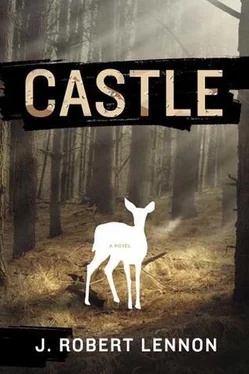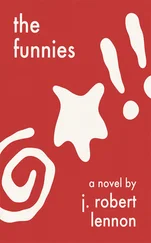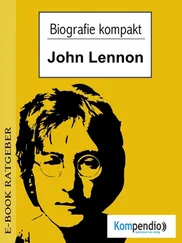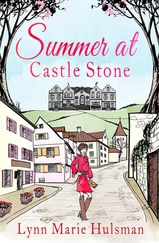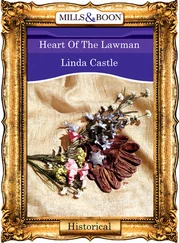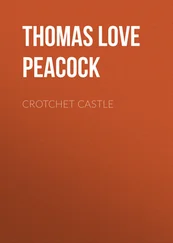I set it down on the table and considered. Clearly, anyone who lived in this area would have no trouble buying as many arrows as he wished. Indeed, I had admired the bow-hunting supplies at the sporting goods store, and briefly considered buying some for myself. It was possible, of
course, that the arrow maker had little money. But surely even a poor sportsman would have access to tools? The arrow appeared to have been made entirely out of found materials, and the tiny peghole, while effective, was too rough to have been made with a drill.
There was one obvious explanation, which had first occurred to me while I lay, bruised and stunned, at the bottom of the pit: that somebody was living in the woods. I had previously assumed that, if this had ever been true, it was certainly not true now. But I could deny it no more. Someone was in the woods — in the castle, quite probably — and this person had dug the pit, stolen my pack, and killed the white deer. Furthermore, it was possible that this person was the same man who owned the land to the east of the rock — the vanished psychologist, Doctor Avery Stiles.
On the face of it, the theory seemed ridiculous. A mad doctor, hiding out for thirty years in an abandoned castle? But the facts lent themselves to this strange explanation, and I had to assume, in the absence of conflicting evidence, that it was correct. Of course, Doctor Stiles would be quite old by now — nearly eighty, in fact — and it hardly seemed reasonable to think that such an elderly man could survive alone, particularly in the harsh winter climate of the region. Nevertheless, no better explanation presented itself. A crazy old man was living in my woods, and did not appear to want me around. These were the facts, and, as such, had to be dealt with.
Randall had not indicated a time to meet him and Heph at the Amvets. I assumed that this meant they would be spending quite a long time there, so I decided not to worry about being punctual. After a bath and a long nap, I went into town for dinner. I was still disgusted with myself for having eaten the fast food cheeseburger the day before, and vowed to find more nourishing fare; after driving around Milan for a good twenty minutes, I believed I had found it in a small, tidy restaurant called Vegan Delights. It occupied an unlikely corner of a parking lot that primarily served a dilapidated shopping center, and looked more like a gas station than a health food establishment, but I found several appealing items on the menu and ordered one without significant consideration.
The place was sparsely patronized by scattered collections of hippies and loners, who thoughtfully chewed their food without saying much to one another. There had been a time in my life when I had reacted to such people with deep disdain. In those days, I viewed pacifism and activism as expressions of cowardice, and had even gone so far as to pick fights with anyone who espoused such radical ideas. Indeed, I considered such people inherently, and willfully, weak — and believed that their political views were merely a convenient means of justifying their weakness. Eventually I would learn that all human beings are inherently weak, and that our efforts to overcome that weakness are little more than pathetic sallies up the face of an impossibly high mountain. As a result, I came to a somewhat more nuanced understanding of “alternative” lifestyles. But I was still uncomfortable in the presence of such people, finding them unreasonably indulgent of their frailties. Furthermore, I could feel their judgment of me: doubtless they found my trim profile, stern bearing, and unwavering gaze discomfiting. The people here tonight, however, appeared focused on their food and on one another, and I was left in peace.
Eventually my waitress, an attractive, dreadlocked young woman with hairy underarms, brought me my falafel, and I ate it while reading the day’s paper, a used copy of which had awaited me in the booth. The paper was filled with inconsequential things — businesses opening or closing, town council meetings, births and deaths. I wondered, idly, why most people were so disconnected from world events, why they only seemed to care about those things that affected them directly, rather than those with broad consequences. But then again, I thought, I myself had lately been guilty of this same self-absorption.
I sighed, picking at the remains of my food. The waitress returned, asking if I was still working on it. I told her I was not. I paid, and left.
It was not exactly on a whim that I decided to visit the sporting goods store again; the possibility had lodged itself in the back of my mind earlier that day, I was burying the white deer. I pulled into the parking lot at a quarter past eight. The store was mostly empty save for its employees, who were obviously preparing to close for the night. Nevertheless, I walked to the gun counter and told the woman working there that I wished to buy a handgun. Her chin creased in distaste — the necessary paperwork would keep her here past closing. But she capitulated.
“What are you looking for?” she asked me. She was about forty, sandy-haired, with a flat, unfriendly affect. I felt very comfortable dealing with her.
“A Browning nine-millimeter,” I replied. There were better firearms, but it was the Browning I was used to.
She showed me what they had: a used P-35 Mark III, and a new HP-SFS, with its improved safety. The P-35 was unadulterated by its previous owner, which was good news — I preferred to customize my own weapon, and smooth operation of the Browning required certain modifications. I told her without hesitation that I would take it, and filled out the proper papers. I was finished by closing time.
“Well that was easy,” the clerk said, with obvious relief. “We’ll give you a call when the check comes through.”
“Excellent,” I replied.
I left the store feeling much more safe and secure, even though I didn’t have the Browning yet. It was the feel of it in my hand; in spite of its flaws, or perhaps because of them, it filled me with confidence. I thought of my father’s Enfield then, and wondered if it had made him feel the same way. Of course, in reality, the gun did not make him safer — on the contrary, it was the instrument of his death. But I was not my father.
The Amvets was exactly where it had always been, and appeared not to have changed since I was a child. It was a low, long structure with a peakless roof that sloped back toward the parking lot; there were no windows, save for a wall on one end made almost entirely of glass blocks. It was beside this wall that I found Randall and Heph, occupying one end of a large buffet table, along with three pint glasses and two pitchers of beer, one full, one nearly empty. They waved me over and, before I arrived, shared a hearty laugh.
“We had a bet goin’, didn’t we, Randy, on whether or not you’d show up, Mr. Loesch!” Heph smacked his dungaree’d knee.
“What side were you on, Heph?”
“Welp, I thought you would come! Randy thought not.”
Randall offered his large, dry hand to be shaken. I obliged. “Glad you decided to join us,” he said.
“Me too.” I turned to Heph. “Heph, you should call me Eric, if we’re going to be friends.”
“All right then, Eric!” The entire exchange appeared to amuse him no end. I could see that he would make a fine drinking companion.
I sat down and poured myself a glass of beer, offering to pay for my share. The offer was quickly refused. I listened to the two of them for a short while; they talked about bass fishing. Eventually the discussion turned to local matters, and I revealed that I had, in fact, grown up in the area, which they did not appear surprised to learn. This led to the subjects of childhood pursuits and shared acquaintances. I was not especially helpful with the latter, as my family had not had strong social connections here, and as I was a number of years younger than Randall and Heph. But we knew of certain names in common, and discussion was lively until, at last, it petered out.
Читать дальше
